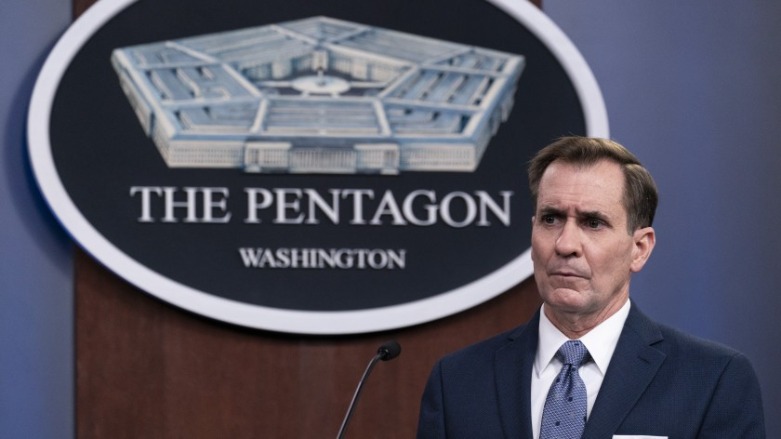US strike destroyed eleven facilities at Abu Kamal

WASHINGTON DC (Kurdistan 24) – On Friday, US Pentagon Press Secretary John Kirby, speaking to journalists, provided details of the US air strikes conducted the night before on two Iraqi militias.
Kirby explained that the air strikes had destroyed eleven “facilities” in Abu Kamal, on the Syrian side of the border with Iraq, which had been used by the militias responsible for the recent rocket attacks on US and Coalition targets, including in Erbil.
“Two F-15 E Strike Eagles dropped seven precision guided munitions,” Kirby said, “totally destroying nine facilities and partially destroying two facilities, making them functionally destroyed.”
“The structures were located,” Kirby stated, at what he called “the Abu Kamal Terrorist Entry Control Point.”
Iran’s “Land Bridge” to the Mediterranean
The border crossing between Syria and Iraq is controlled by the two militias that the US struck—Kata’ib Hizbollah (Battalions of the Party of God) and Kata’ib Sayyid al-Shuhada (Battalions of the Master of the Martyrs)—or at least controlled by parties friendly to them.
The militias use the border crossing to transfer weapons and other material between Syria and Iraq, and it has become a key site in Iran’s “land bridge” to the Mediterranean.
That is a source of significant concern to Israel, which has repeatedly bombed the same area. Indeed, just eight weeks ago, Israel conducted what the Associated Press described as “intense airstrikes” there.
The “airstrikes were carried out with intelligence provided by the United States,” the news agency reported. It is likely that the same intelligence was used in the targeting for the US strike. Perhaps, even, the US struck targets that were missed, or insufficiently damaged, in the Israeli military operation last month.
Kirby used the word “facilities” to characterize the targets of the US strike, but did not provide further details, beyond saying that “all the buildings were on a single compound” and “used by these groups to facilitate the movement” of “materiel and weaponry into Iraq to conduct the attacks.”
The area includes the Imam Ali military base, which Iran began building on Syrian soil in 2018. Michael Knights, of The Washington Institute for Near East Policy, explained that the base was used “to store Iranian rockets, drones, and the military industrial equipment needed to make and maintain them.”
Biden Administration: Iran was Behind the Groups that Attacked the Coalition
Kirby affirmed—unambiguously—that both groups involved in the rocket attacks were backed by Iran, as he expressed the administration’s concern about “what Iran has been doing in the region and their malign activities, to include their support for these militia groups.”
Rep. Michael McCaul (Texas), the Lead Republican on the House Foreign Affairs Committee, had, more than any other US official, called publicly on the Biden administration to take action in response to the rocket attacks in order to prevent future assaults.
READ MORE: Rep. McCaul calls for quick, decisive action to rocket attacks in Iraq
On Thursday night, after the Pentagon announced news of the US airstrike, McCaul issued a statement affirming, “Responses like this are a necessary deterrent and remind Iran, its proxies, and our adversaries around the world that attacks on US interests will not be tolerated.”
Indeed, in describing the US attack, Kirby repeatedly stressed that it had been “a defensive operation to protect our troops and our coalition partners.” That included sending a “deterrent message” about “the repercussions of going after our people and our Iraqi partners and our facilities inside Iraq.”
Kirby repeatedly expressed America’s appreciation for the investigative work of its “Iraqi and Kurdish partners,” describing that as “critical” in helping the US understand which parties had been behind the rocket attacks.
The US could easily have delivered a far stronger blow, but the Biden administration is balancing the requirements of deterrence to stop future Iranian-backed assaults in Iraq with its desire to return to nuclear negotiations with Iran.
Biden had been presented a “range of options,” Reuters reported, citing a US official, speaking on condition of anonymity, and the US President chose “one of the most limited responses.”
Editing by Khrush Najari
